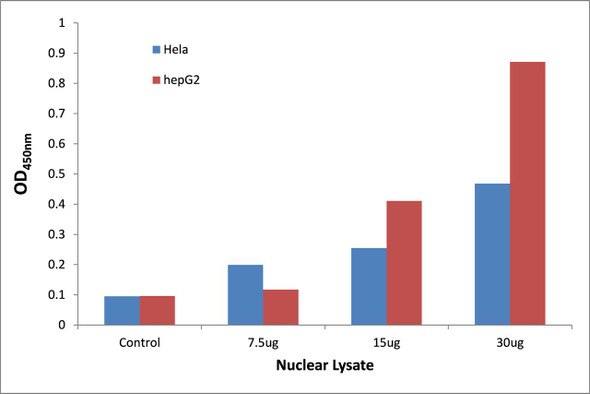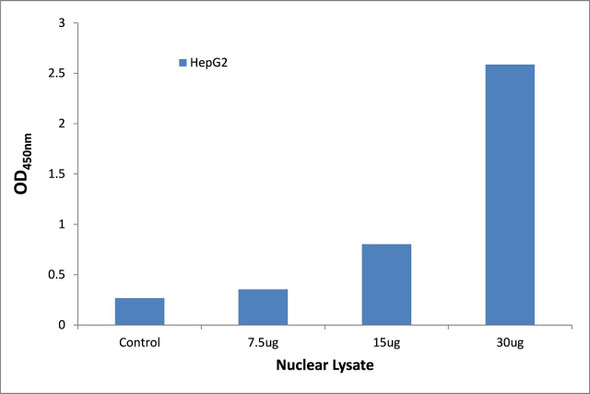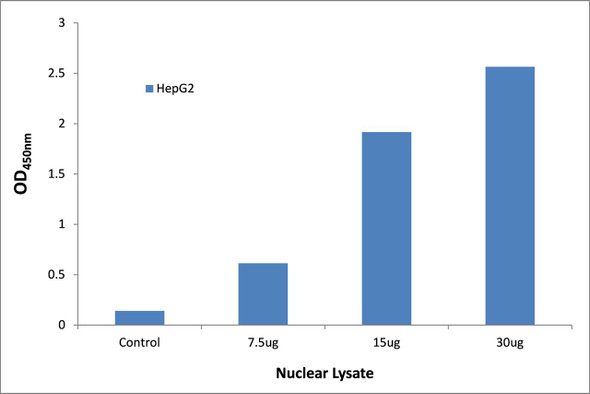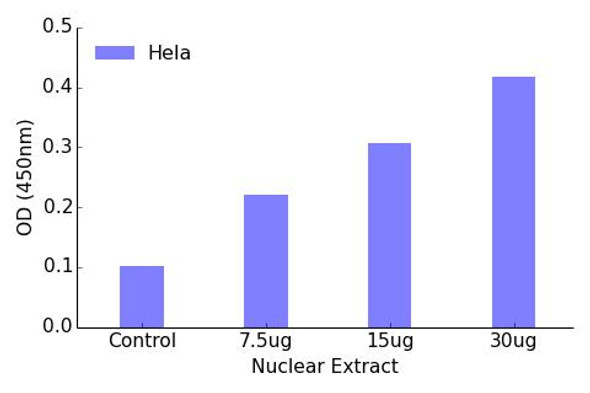NF-kappaB p65 Transcription Factor Activity Assay
- SKU:
- TFAB00141
- Product Type:
- ELISA Kit
- ELISA Type:
- Transcription Factor Assay
- Analytes:
- NF-kappaB p65
- Reactivity:
- Human
- Mouse
- Rat
Description
NF-kappaB p65 Transcription Factor Activity Assay
The NF-kappaB p65 Transcription Factor Activity Assay is a highly sensitive and specific kit designed for the accurate detection of NF-kappaB p65 transcription factor activity in various biological samples. This assay is ideal for researchers studying inflammation, immune response, and gene regulation.NF-kappaB p65 is a key transcription factor that plays a vital role in regulating the expression of genes involved in inflammatory and immune responses.
Dysregulation of NF-kappaB p65 activity has been linked to various diseases, including cancer, autoimmune disorders, and inflammatory conditions.With its high sensitivity and reliability, the NF-kappaB p65 Transcription Factor Activity Assay from Assay Genie provides researchers with a valuable tool for studying the role of NF-kappaB p65 in disease pathogenesis and developing potential therapeutic strategies.
| Product Name: | NF-kappaB p65 Transcription Factor Activity Assay |
| Product Code: | TFAB00141 |
| Target: | NF-kappaB p65 |
| Synonyms: | Nuclear factor NF-kappa-B p65 subunit, Nuclear factor of kappa light polypeptide gene enhancer in B-cells 3 |
| Reactivity: | Human, Mouse, Rat |
| Sample Types: | Nuclear or cell lysates |
The Assay Genie NF-kappaB p65 transcription factor activity assay allows for the detection and qualitative analysis of endogenous levels of activated transcription factors in a variety of nuclear and cell lysates
Assay Genie ELISA kits are designed to significantly reduce experiment time and ensure sensitivity and flexibility for high-throughput screening.
| Assay Time: | 4.5 hours |
| Detection Method: | Colorimetric 450 nm |
| Size: | 12 x 8-Well Microstrips |
| Storage: | 4°C for 6 months |
| UniProt Protein Function: | NFkB-p65: a subunit of NF-kappa-B transcription complex, which plays a crucial role in inflammatory and immune responses. The inhibitory effect of I-kappa-B upon NF-kappa-B in the cytoplasm is exerted primarily through the interaction with p65. P65 shows a weak DNA-binding site which could contribute directly to DNA binding in the NF-kappa-B complex. There are five NFkB proteins in mammals (RelA/NFkB-p65, RelB, c-Rel, NF-_B1/NFkB-p105, and NF-_B2/NFkB-p100). They form a variety of homodimers and heterodimers, each of which activates its own characteristic set of genes. Three splice-variant isoforms have been identified. |
| UniProt Protein Details: | Protein type:DNA-binding; Nuclear receptor co-regulator; Transcription factor Chromosomal Location of Human Ortholog: 11q13.1 Cellular Component: cytoplasm; cytosol; nuclear chromatin; nucleoplasm; nucleus; transcription factor complex Molecular Function:actinin binding; chromatin binding; chromatin DNA binding; DNA binding; histone deacetylase binding; identical protein binding; NF-kappaB binding; phosphate binding; protein binding; protein heterodimerization activity; protein homodimerization activity; protein kinase binding; protein N-terminus binding; RNA polymerase II transcription factor activity, enhancer binding; transcription activator binding; transcription factor activity; transcription factor binding; ubiquitin protein ligase binding Biological Process: activation of NF-kappaB transcription factor; cytokine and chemokine mediated signaling pathway; inflammatory response; membrane protein intracellular domain proteolysis; negative regulation of apoptosis; negative regulation of transcription from RNA polymerase II promoter; negative regulation of transcription, DNA-dependent; positive regulation of cell proliferation; positive regulation of I-kappaB kinase/NF-kappaB cascade; positive regulation of interferon type I production; positive regulation of transcription from RNA polymerase II promoter; positive regulation of transcription, DNA-dependent; regulation of inflammatory response; response to organic substance; response to UV-B; stimulatory C-type lectin receptor signaling pathway; T cell receptor signaling pathway |
| NCBI Summary: | NF-kappa-B is a ubiquitous transcription factor involved in several biological processes. It is held in the cytoplasm in an inactive state by specific inhibitors. Upon degradation of the inhibitor, NF-kappa-B moves to the nucleus and activates transcription of specific genes. NF-kappa-B is composed of NFKB1 or NFKB2 bound to either REL, RELA, or RELB. The most abundant form of NF-kappa-B is NFKB1 complexed with the product of this gene, RELA. Four transcript variants encoding different isoforms have been found for this gene. [provided by RefSeq, Sep 2011] |
| UniProt Code: | Q04206 |
| NCBI GenInfo Identifier: | 62906901 |
| NCBI Gene ID: | 5970 |
| NCBI Accession: | Q04206.2 |
| UniProt Secondary Accession: | Q04206,Q6GTV1, Q6SLK1, |
| UniProt Related Accession: | Q04206 |
| Molecular Weight: | 59,910 Da |
| NCBI Full Name: | Transcription factor p65 |
| NCBI Synonym Full Names: | RELA proto-oncogene, NF-kB subunit |
| NCBI Official Symbol: | RELA |
| NCBI Official Synonym Symbols: | p65; NFKB3 |
| NCBI Protein Information: | transcription factor p65 |
| UniProt Protein Name: | Transcription factor p65 |
| UniProt Synonym Protein Names: | Nuclear factor NF-kappa-B p65 subunit; Nuclear factor of kappa light polypeptide gene enhancer in B-cells 3 |
| Protein Family: | Proline-rich P65 protein |
| UniProt Gene Name: | RELA |










